21 March 2011 - 27 March 2011
28 March 2011 - 3 April 2011
4 April 2011 - 10 April 2011
11 April 2011 - 17 April 2011
18 April 2011 - 24 April 2011
Why so long? Well, I imagine looking at this will explain that:
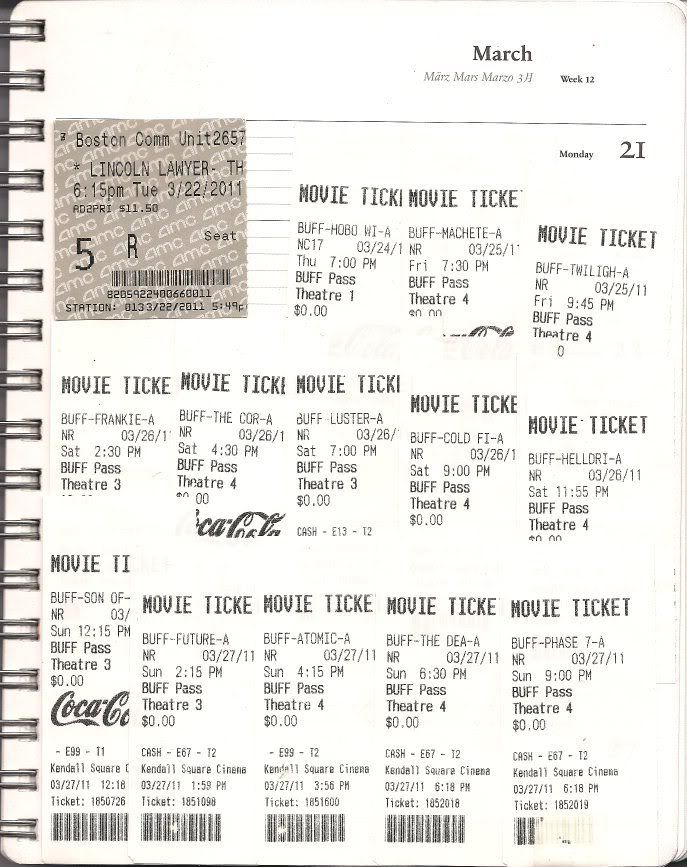
13 movies (including a shorts package) in four days isn't quite peak festival gorging, but it was a work week too. Of all the movies to choose to see that week, The Lincoln Lawyer may seem an odd one, but Lionsgate and Fandango were running an online promotion where the ticket cost $6, so I wound up trying to get that in before BUFF.
The Lincoln Lawyer
* * * (out of four)
Seen 2 March 2011 in AMC Boston Common #5 (first-run)
The Lincoln Lawyer doesn't re-invent the wheel, but it doesn't have to. It's a fun crime story that works as both mystery and legal thriller, thanks to a nice cast, polished production values, and a story that stays just on the right side of being too clever for its own good.
There are, admittedly, times when the movie feels less like a feature film than an episode of a television series. Not because it seems cheap or pat; rather because of the large supporting cast that are around to do one specific job here but could theoretically me more central in next week's story. I don't know if Michael Connelly has written more Mick Haller novels, but I wouldn't mind seeing them adapted if he has. Matthew McConaughey slips easily into the role of the slick huckster who may just have a decent core to him, and the folks surrounding Haller bounce off him nicely.
The script could perhaps use a little bit of work; there are bits where it seemed screenwriter John Romano has perhaps simplified something that a novelist can take his time explaining a little too much, and even those of us who basically learned what we know about jurisprudence from Law & Order may wonder if some of the courtroom antics would work for even a second. The finale's a little too pat, perhaps. It's forgivable stuff - the end is satisfying, even if it does strain credibility a little, and it's easy enough to go along with things up until then.
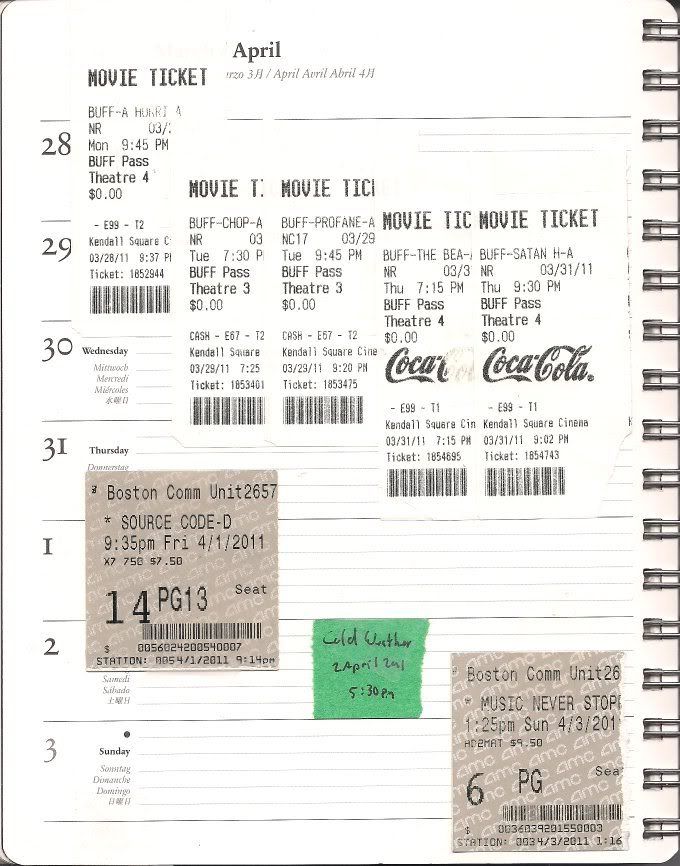
I did sort of want a breather after BUFF, but I wasn't going to wait much longer to see Source Code than necessary (and picking one of those gold tickets up for $4 from an online coupon site a few months ago would keep it at a reasonable price). I wound up falling a little behind on the reviews because nobody else on EFC was going to write about Cold Weather or The Music Never Stopped, and I wanted to talk about them before they left Boston theaters.
Oh, by the way - I'm going to talk about the end of Source Code, so if you don't want any of that, you can skip ahead.
Source Code
* * * ½ (out of four)
Seen 1 April 2011 in AMC Boston Common #14 (first-run, DLP projection)
As a computer programmer, I'm kind of annoyed by the name of Source Code. Well, not really as a computer programmer; I suspect that I wouldn't really be cool with taking a technical term with a specific meaning and using it to refer to whatever you want no matter what it was. Because I've been programming computers since I was seven, I just happen to recognize that this movie's "source code" isn't a text file that is assembled or compiled into executable machine language.
But that's about all I have for complaints. Much as he did with Moon, director Duncan Jones takes a story potentially full of technical jargon and weird concepts and gives the audience an emotional connection without reducing the science fictional ideas to standard genre fare that's been tarted up with laser guns. He and writer Ben Ripley do sling a lot of pseudoscience (the the point where I suspect no two audience members will have quite the same explanation of what "the source code" is), but they also do a nice job in structuring the movie - both the scenes on a military base with Vera Farmiga and Jeffrey Wright running a program to investigate the bombing of a commuter train using weird science and on the train with Michelle Monaghan and confused by the odd behavior of her seatmate (not aware or able to believe that he's "possessed" by a soldier whose consciousness has been thrown back in time) are nice little thrillers, connected only by Jake Gyllenhaal as the soldier. Ripley doesn't make either one too complicated, and he and Jones make the combination of simple and complex plots work. Jones proves to be a solid filmmaker in this more mainstream effort, not compromising for a larger audience and keeping things running smoothly even though he isn't able to exert quite the control he could with Moon.
I like Jake Gyllenhaal in this sort of role; he's got action-hero physicality but comes off as down-to-earth. His Colter Stevens is exactly what you'd expect of a soldier in this situation: Cocky but confused, intelligent if not necessarily book-smart, a blue-collar guy out of sorts in his current surroundings (props to the costume guys, who help out by making him look reasonable but wrong in the train sequences). Vera Farmiga plays another sort of military character, the professional career officer who nonetheless has a conscience, and she handles it well - she builds a rapport with Gyllenhaal despite their characters mainly communicating over computer monitors. Jeffrey Wright plays the chief scientist as the pompous, egotistical sort, and does so more and more as the film goes on, but it never tips toward the negative. Michelle Monaghan is rather underused; she's mainly there to be beautiful and appealing enough that we can believe Colter falls for her within eight minutes. There's probably nobody more qualified for the job, but it would be nice if she were a more active participant.
And, perhaps, it might make the ending work a little better. I like how this movie ends, but I get some of the complaints that people might have about it. The source code is poorly enough defined that I can understand that some people think that it's a simulation of sorts, although the end states pretty definitively that there's quantum stuff going on that creates new, divergent realities/timelines. Some folks seem not to like it because the dark ending was in play, but I kind of dig that Jones and company don't go for it. Not just on the basis of wondering what's so wrong with rewarding your heroes, but because I like that Duncan Jones's science fiction isn't cynical. Yes, there are bad people in control of technology, using it in fairly horrific ways, but it can be used for good.
Of course, there are some awkward conversations to come at the end of each of Jones's movies. That's the other issue that one may potentially have with that ending - sure, it's great that Colter is getting a second chance, but it's at the expense of someone else's life, and the girl he's going to be romancing thinks he's that someone else. Doesn't sound so noble, does it? I think it's acceptable, though: - Colter is inevitably going to tell Christina the truth; he's attempted to with almost every iteration, and it's just who he is. As to the creepiness of taking over another man's life... Well, the man was eight minutes from certain death in the original timeline, and with this being a new one, you could argue that there was never an original in that timeline.
That would be a heck of a lot to explain in not a little time in the end, though, and it would blunt the emotional impact of the finale something fierce. I don't think it's hard to figure out with a little thought, though it could have been made clearer earlier.
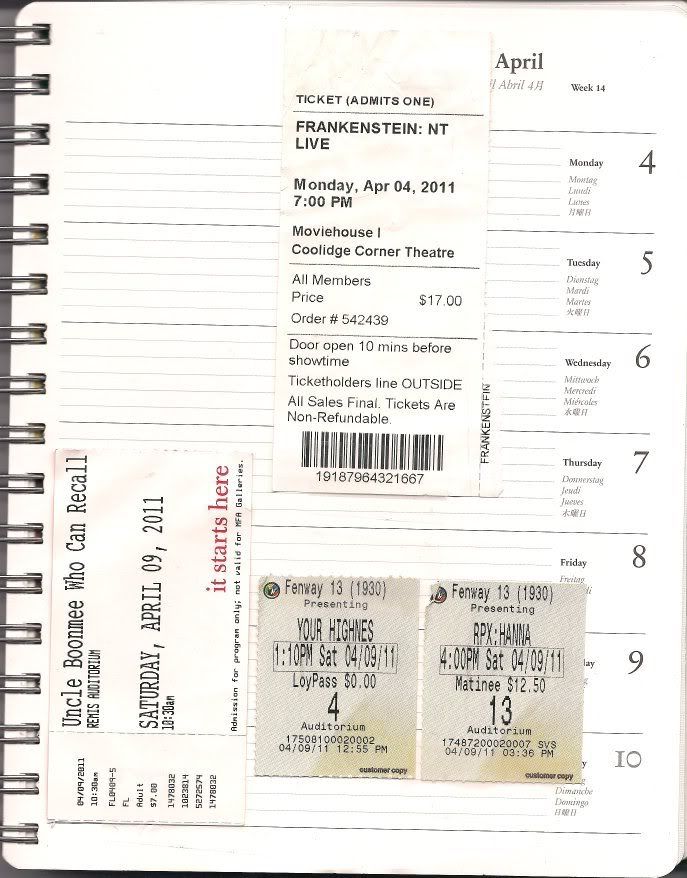
Honestly, I'd forgotten I had tickets for Frankenstein until just a couple days before the screening. It had been a busy week.
Huh, someday I'm going to figure out why I instinctively write "tickets" when the normal case for me is generally a single. There's societal pressures at work there, I reckon.
Saturday at the multiplex was a bit about me trying to put my money where my mouth is about using loyalty programs and different showtimes to send a message. I wanted my big ticket purchase to be for Hanna, so I wound up seeing that on the premium screen as opposed to the others, and used an expiring-that-day free pass on Your Highness, which happened to be on film as opposed to digital. I honestly might not have seen Your Highness if not for that expiring freebie (which couldn't be used on the premium screen, even if you paid the difference), and, well, sometimes you get what you pay for.
NT Live: Frankenstein
* * * ½ (out of four)
Seen 4 April 2011 in Coolidge Corner Theatre #1 (NT Live, digital projection)
Not really a movie, but rather a simulcast of a play (or, in this case, I think it's the encore presentation of a simulcast of a play; a 7pm Eastern start would be, what, midnight Greenwich Mean?), although director Danny Boyle is probably best known for his film work. The gimmick to this production of England's National Theatre is a clever one: On alternate nights, the two lead actors would switch between playing Victor and the Creature; for this performance, Benedict Cumberbatch was the former and Jonny Lee Miller the latter. I'm kind of annoyed with myself for not getting tickets to both times it ran at the Coolidge, because that seems like the obvious casting, and I'm very curious as to what the other way around was like.
This version, at least, was quite good. With its two strong antagonists, Mary Shalley's novel translates to the stage fairly well, especially since it doesn't take the adaptation very long to give us the verbal, well-read Creature of the original story as opposed to Karloff's silent, child-like hulk. The decision to tell much of the play from the Creature's point of view, starting from its "birth", is a clever one, giving us a unique and visceral look at his confusion that the nested narratives of the book perhaps lacks.
It's a good-looking adaptation, too, done not quite in the round but with an impressively malleable stage setting. It's maybe a little difficult to tell that Boyle is the one behind it - so much of what we associate with his style is a moving camera and how he cuts his film, and that's just not a factor on the stage. For the cinematic presentation, the camera does move, which initially seems like a bit of a cheat - it means sitting in the Coolidge isn't really like sitting at the National Theatre in London, but rather hopping from one seat to another.
I hope I get a chance to see the other version, whether it be on television, DVD/Blu-ray, or another encore at the Coolidge. It's an interesting adaptation of the work, and part of the fun of seeing plays is how different people interpret the same material.
Loong Boonmee raleuk chat (Uncle Boonmee Who Can Recall His Past Lives)
* * * ¼ (out of four)
Seen 9 April 2011 in the Museum of Fine Arts Remis Auditorium (special engagement)
Uncle Boonmee Who Can Recall His Past Lives is a weird one; writer/director Apichatpong Weerasethakul takes us to a forest teeming with life to deliver a quiet meditation on life, death, and rebirth. It's graceful and nonsensical, maybe not for all tastes but perhaps for more than one might imagine.
Boonmee (Thanapat Saisaymar) is dying. There's cancer in his kidneys, and though he's not entirely bedridden, he knows the end is near. So he's called what's left of his family to his farm - his sister-in-law Jen (Jenjira Pongpas) and her son Tong (Sakda Kaewbuadee), Soon, though, he finds himself with other visitors - his late wife Huay (Natthakarn Aphaiwonk) and his long-lost son Boonsong (Geerasak Kulhong). Clearly, the border between this life and the next is growing extremely thin.
In some movies, that would be the springboard for a fantasy story; in this one, the likes of ghosts and monkey spirits are simply accepted, for the most part. Not blandly - several scenes which involve the monkey spirits are in fact rather unnerving; their glowing red eyes and dark silhouettes make them clearly other, if not threatening. These manifestations are not part of everyday life, but they are things which do not require explanation - the forest contains spirits, and imprints of the living linger and do appreciate offerings. Indeed, while the characters seldom comment upon the supernatural creatures which appear around them - Jen quite frequently seems more worried about the Laotian workers Boonmee has hired than her dead sister reappearing - it clearly has an effect on them in the closing scenes.
Full review at EFC.
Your Highness
* * (out of four)
Seen 9 April 2011 in Regal Fenway #4 (first-run)
You want your mind blown? Go to the IMDB entry for All the Real Girls. I started making jokes about that as soon as I realized that Zooey Deschanel was in Your Highness, but finding that Danny McBride was also in that cast was kind of amazing. These people (McBride, Deschanel, and director David Gordon Green) went from a quality, achingly real movie like Girls to this thing in about ten years. I can understand making Pineapple Express - even the indie-est of indie directors must secretly want to blow some things up every once in a while - but it's starting to look like Green was making quality dramas because that's all that he could afford to do on his way up, and dumb comedies were where his heart really was. Which is kind of odd.
The really weird thing about Your Highness isn't that Green is doing this sort of movie, or that I can barely remember Zooey Deschanel seeming like a young actress with a lot of promise as opposed to a pretty piece of mannered quirk. It's that despite the title, there's very little weed comedy in it. That's the obvious pun that the title is going for, and there are a couple off-hand mentions of it (but, strangely, never in connection to James Franco's noble prince character, and he's the one who seems high most of the time), but the basic story is basically fraternal jealousy grafted onto a quest that takes a sudden turn for the sincere once we hit the third act.
Less weird than annoying is that Green and co-writers McBride and Ben Best seem to not quite grasp what could make this movie really funny. A good chunk of the comedy comes from spoofing fantasy of the sword & sorcery, except that spoofing isn't really the right word. Spoof and parody are generally good-natured ribbing, whereas McBride and Best display a genuine vicious streak. The quest is quite specifically about preventing Justin Theroux's evil wizard from raping Deschanel's virgin, there are gags about child molestation and dismemberment, and other forms of nastiness. Natalie Portman's warrior woman is basically a sociopath. Your Highness at times seems like an astonishingly aggressive de-romanticizing of high fantasy (I'm reminded of how Punch Drunk Love took Adam Sandler movies apart to show the underlying ugliness) by showing what a miserable place an enchanted kingdom populated by actual human beings would be to live in would be, but it's almost like the filmmakers don't realize that their combination of parody and crude jokes almost add up to satire.
But not quite. Too bad, because I laughed the most when the movie was at its most vicious. Granted, I strongly suspect that this wasn't really on the mind of anybody making the movie - I sort of hate this genre and am very willing to see attacks on it, while the filmmakers were probably trying to combine things they loved (fantasy and vulgarity).
Hanna
* * * ½ (out of four)
Seen 9 April 2011 in Regal Fenway #13 (first-run, RPX digital projection)
Hanna got itself some attention by director Joe Wright positioning it as the smart teen-girl action flick in contrast to Sucker Punch, although putting it next to a movie that got very little respect and angered many critics for calling itself "visionary" and/or "empowering" may be the equivalent of standing next to a short guy to make oneself look tall.
It is, on its own, pretty darn good. If you're aiming to make a great movie with a young woman at the center, "hire Saoirse Ronan" is a good place to start. She can't necessarily cure all that ails a film - The Lovely Bones, for instance, suffered greatly from having her remain separate from the rest of the cast - but she's been the best part of nearly every movie she's been in. Here, she's pretty darn good as the title character, a girl brought up in the wilderness by her father (Eric Bana), trained to hunt, fight, and speak a dozen languages, but with no interaction with other people; her knowledge of the outside world mainly shaped by a book of fairy tales. It's a nifty performance, only occasionally leaning on her acting like an ignoramus - most of the time, though she's clearly unfamiliar with the world around her, she's curious and intelligent.
The story itself is sort of a Bourne Identity thing - a variation on the dangerous operative hunted down by an intelligence agency trying to keep a program quiet - but it's a niftily made one. While main antagonists Eric Bana and Cate Blanchett often seem a bit like ciphers (with some odd accents to boot), most of the smaller parts (like Olivia Williams) are well-done, and director Joe Wright does a lot of things to give this movie a different feel: The sharp contrast between the polished steel of the CIA's interrogation chamber and the almost surreal shuttered amusement park where the action winds up. The funky Chemical Brothers soundtrack. And one or two amazing long tracking shots, better-used here than in Atonement, where it just looked like showing off as opposed to giving the audience a real idea of what's going on in a fight.
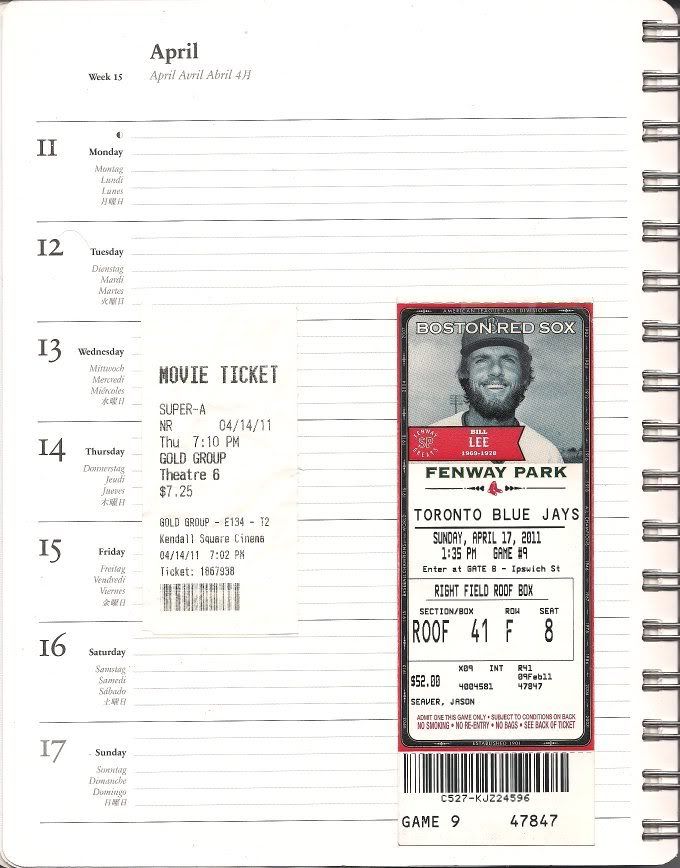
Hello, baseball. You have been missed.
This was my first game attended this year, and it was a pretty good time. There was a bit of craziness in the week beforehand trying to get the tickets sorted out - the brother who was originally going to come had to bail, and then Matt couldn't say for sure that he was coming until the last minute - and there was a bit of rain to start the day, but overall, there's not much nicer than sitting in the sun at Fenway Park and watch the Red Sox start to crawl out of the hole they'd dug themselves.
Super
* * (out of four)
Seen 14 April 2011 in Landmark Kendall Square #6 (first-run)
As much as I think Roger Ebert's spoiler-ridden review of this movie is very bad form (seriously, don't find and read it unless you want a major development from the finale spoiled in the first paragraph), I do find myself similarly confused on who Super is trying to appeal to. It's not a mean-spirited movie, but it is a fairly joyless one.
It has its moments, to be sure - especially the energetic animated opening titles - but despite being promoted by its connection to writer/director James Gunn's Slither, it shares more cast members than attitude. This is a movie about a loser, and how for many people like Rainn Wilson's Frank D'Arbo, it's very difficult to rise above mediocrity in a positive way, and that even when seizing the things that which bring you joy and pride, the outcome is destructive more often than not. That's a sobering thought, and it's somewhat impressive that Gunn doesn't really ever flinch from it - we never harbor any illusions of The Crimson Bolt or Boltie being a great superhero, even when lesser movies might play the last act like that.
This doesn't actually make Super a bad movie, or even really a cynical one. Just one where the rewards are quite possibly much more modest and subtle than either the viewer or main character expected.
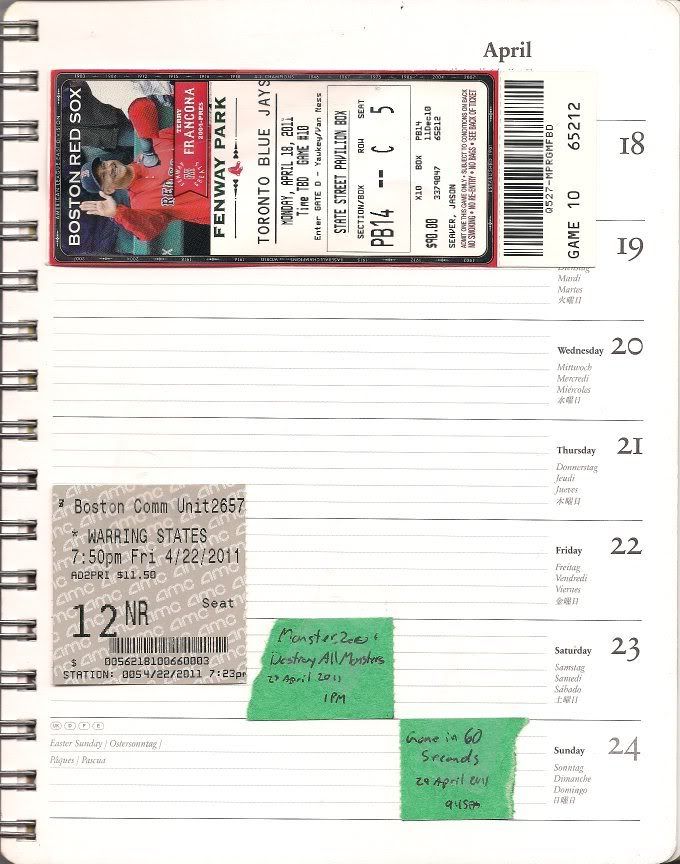
Two baseball games in two days! Not really a deliberate plan - I got a 4-pack to share with family for Christmas, and another one for myself, and the way they were set up had games on consecutive days. This was another good one, with Jed Lowrie continuing his ridiculously hot start and Daisuke Matsuzaka making all of us who joked about the appropriateness of him starting on Marathon Monday eat our words.
Speaking of Marathon Monday - I always forget just how utterly impassable Boston becomes once the runners start. It took me the usual forty minutes to walk from my house to the ballpark, but an absurd amount of time to get back, because there's really no easy way to cross Commonwealth Avenue on foot while it's blocked off for the marathon. I wound up making a huge mistake and getting on the Green Line rather than walking to the Common and either taking the Red Line or just turning left and walking home. Or ducking into a theater and watching a movie while the runners went past. Ah, well. Next year.
Later in the week, I went to The Warring States opening night, figuring maybe that was when these movies had their big crowds, but... not so much. And I had to duck out and tell an usher that the print was misframed. Fortunately, it was a pretty good movie. Not quite in the top tier of Chinese period epics - I figure this is like the Chinese equivalent of a Hollywood light blockbuster that stars second-tier stars and has competent visual effects but nothing groundbreaking - but entertaining nonetheless. And someone must be seeing it, because it's sticking around for another week of evening shows.
The week finishes off with the Brattle's Schlock-Around-The-Clock series; I took in some dubbed kaiju and the original Gone in 60 Seconds. The Creature Double Feature was an odd event - before the screening, one of the projectors went on the fritz, so at the end of each reel, they paused for a minute or two to thread up the next one. Between the commercial-break-approximating pauses and the English dubbing, it must have been like seeing them on WLVI back in the day.
Of course, back then you wouldn't have had the tool a couple rows in front of me who had his iPhone out and was constantly taking pictures of the screen. Really annoying. I can deal with the little girl behind me who was constantly asking her father questions, because parents bringing their kids to the Godzilla double feature is cool, but this other guy? Ugh.
Kaijû daisensô (Monster Zero)
* * ½ (out of four)
Seen 23 April 2011 in the Brattle Theatre (Schlock Around the Clock)
So, this turns out to be a big chunk of where Godzilla: Final Wars comes from, with its X-aliens with the skinny shades to the plot about them bringing monsters to earth; there's even an American co-lead. It is certainly pleasantly goofy, with special effects of the man-in-suit and cardboard variety.
It does kind of boggle my mind a little that these two movies were directed by Ishiro Honda, who wrote the original Gojira, a serious and intelligent film that personified atomic horror. It's hard to believe that htis movie with Godzilla's little victory dance came from it.
Kaijû sôshingeki (Destroy All Monsters)
* * ¼ (out of four)
Seen 23 April 2011 in the Brattle Theatre (Schlock Around the Clock)
Okay, maybe this one is a more direct antecedent to Final Wars, containing as it does almost all of the Toho kaiju. It's a similar storyline - aliens control monsters to make them attack our cities so that they can take over - but the details of it aren't quite so memorable. It lacks the entertaining human/alien villains of Monster Zero and Final Wars.
That said, it does have a tremendously satisfying finale, with the other kaiju just going to town on King Ghidorah. That, at least, is something that sticks out.
Gone in 60 Seconds
* * ½ (out of four)
Seen 23 April 2011 in the Brattle Theatre (Schlock Around the Clock)
Gone in 60 Seconds is an amazing car chase in search of a movie. The final half hour or so is writer/director/star H.B. Halicki tearing across Los Angeles in a 1971 Mustang as what seems like half the city's cops follow. The movie ends abruptly after that, and the set up to get to that point is often pretty perfunctory - a procedural look at the mechanics of grand theft auto and just enough sibling friction to set the chase up.
And you have to kind of admire Halicki's single-minded devotion to his skill set, to be honest. The man knew cars inside out, and apparently knew just enough about movies to get capable work from his team. The rest mostly worked itself out, but even when it didn't, the feeling was that it didn't matter, because the important stuff looked good.
No comments:
Post a Comment